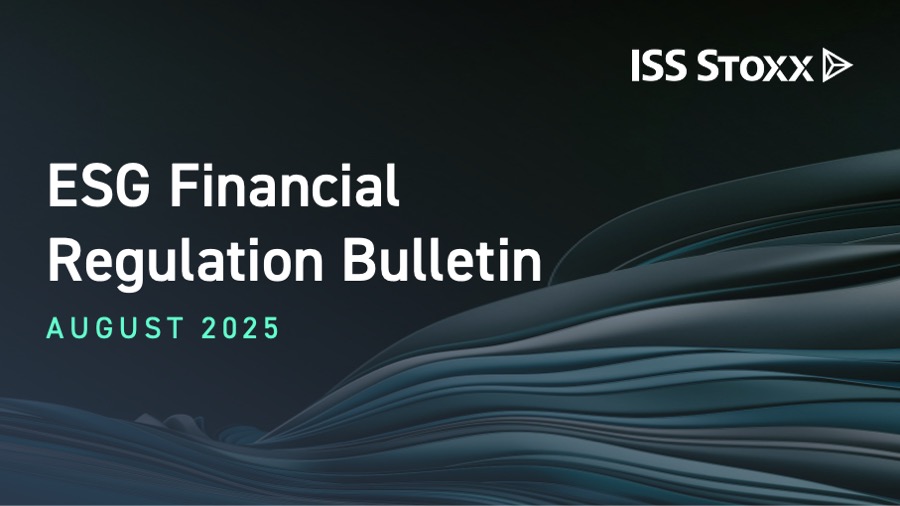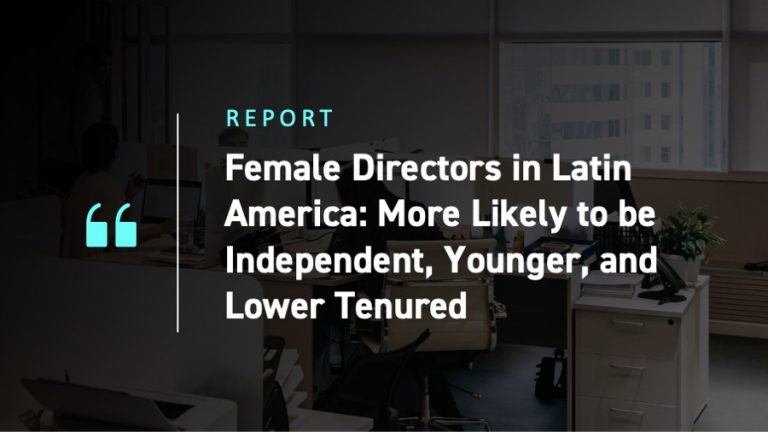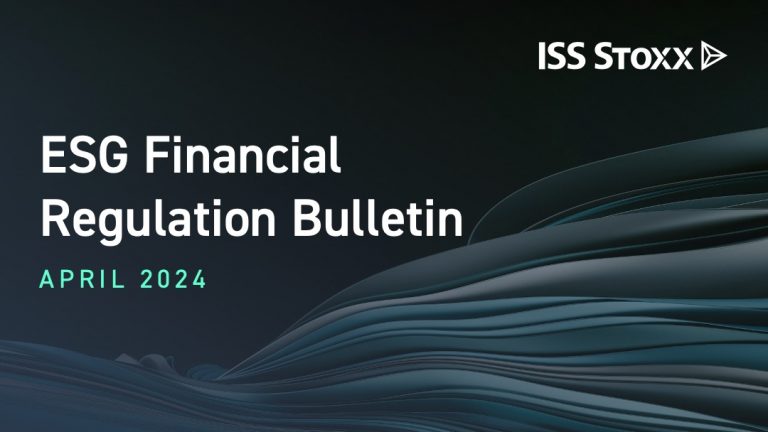
ISSB
International Sustainability Standards Board Proposes Comprehensive Review of Priority SASB Standards and Targeted Amendments to Others
The International Sustainability Standards Board (ISSB) published on July 3 two exposure drafts proposing amendments to the SASB Standards and amendments to the Industry-based Guidance on Implementing IFRS S2. As described, the proposed amendments reflect a comprehensive review of nine priority industries (all eight industries in the Extractives & Minerals Processing sector and the Processed Foods industry). The ISSB amendments also aim to ensure better alignment of ISSB and SASB metrics with respect to 41 industries on matters such as water management and workforce health and safety.
IFRS Foundation Publishes Educational Material on Using ISSB Industry-Based Guidance When Applying ISSB Standards
The IFRS Foundation published educational material to assist companies in understanding the role of ISSB industry-based guidance when applying the IFRS S1 and IFRS S2 disclosures. More specifically, the educational material is meant to help companies in identifying sustainability-related risks and opportunities and the information to disclose about their sustainability-risks and opportunities. The education material also explains the requirement in ISSB Standards that a company “‘shall refer to and consider the applicability of’ the ISSB industry-based guidance, specifically: the Sustainability Accounting Standards Board Standards (SASB Standards) in the context of IFRS S1; and the Industry-based Guidance on Implementing IFRS S2 in the context of IFRS S2.”
IFRS Foundation Publishes Near-Final Examples on the Reporting of Uncertainties in Financial Statements Using Climate-Related Cases
The IFRS Foundation published a staff working document on July 24 providing “near final” examples on the reporting of uncertainties in company financial statements. The IFRS Foundation is providing these examples to demonstrate to companies how they can improve their reporting of uncertainties, using climate-related disclosures for illustrative purposes. The International Accounting Standards Board (IASB) developed the examples in response to stakeholder feedback highlighting the lack of information about how uncertainties are to be reported. The IASB worked with the ISSB to ensure these examples are appropriate to the ISSB’s sustainability-related disclosure requirements.
Specifically, the examples cover materiality judgements when applying paragraph 31 of IAS 1, the disclosure of assumptions: specific requirements, general requirements, disclosure about credit risk, disclosure about decommissioning and restoration provisions, and disclosure of disaggregated information. While the examples relate to climate-related disclosures, the IFRS Foundation clarifies that they can be applied broadly to all types of uncertainties reporting.
TNFD
Taskforce on Nature-related Financial Disclosures Publishes Research on the Financial Materiality of Nature-Related Risks in Collaboration with the University of Oxford, Global Canopy, and the Global Reporting Initiative, as well as Additional Sector Guidance for Water Utilities and Services
The Taskforce on Nature-related Financial Disclosures (TNFD) published a paper on the evidence of financial effects resulting from nature-related risks. According to the announcement, the paper, co-authored by TNFD, the University of Oxford’s Environmental Change Institute, and Global Canopy, demonstrates the financial materiality of nature-related risks. Alongside the paper, the TNFD and Global Reporting Initiative (GRI) also released a set of case studies of businesses identifying nature-related risks and opportunities arising from their dependencies and impacts on nature. The case studies speak to the double materiality approach adopted by some companies in assessing material dependencies and impacts and, in turn, how these dependencies and impacts inform the companies’ identification of risks and opportunities. In addition, the case studies note that stakeholder engagement remains central to materiality assessments and that none of the case studies included engagement with the Indigenous Peoples and Local Communities (IPLCs). Finally, the report on the case studies concludes, recognition of the interconnection between climate change and nature-related impacts is growing and increasingly informs company assessments.
The TNFD also published additional sector guidance for water utilities and services, supplementing the TNFD’s Guidance on the identification and assessment of nature-related issues: The LEAP approach.
FSB
Financial Stability Board Updates Roadmap for Addressing Financial Risks from Climate Change
The Financial Stability Board (FSB) published an update on July 14 to its Roadmap for Addressing Financial Risks from Climate Change in the context of the G20 Finance Ministers and Central Bank Governors’ July meeting. The update outlines the work undertaken by the FSB, various standard-setting bodies, and other international organizations, including the Task Force on Climate-related Financial Disclosures (TCFD), ISSB, and the European Financial Reporting Advisory Group (EFRAG), in relation to disclosures, data quality, vulnerabilities analysis, and supervisory practices and tools across multiple jurisdictions since the publication of the first Roadmap in 2021.
SBTi
Science Based Targets initiative Releases Net-Zero Standard for Financial Institutions
The Science Based Targets initiative (SBTi) released its net-zero standard for the finance industry on July 22. As described, the standard aims to enable financial institutions to set science-based climate targets aligned with the objective of achieving net-zero by 2050 according to a clear, science-based framework designed specifically for banks, asset owners and managers, private equity firms, and other financial institutions. The Standard is fully aligned with the SBTI’s flagship Corporate Net-Zero Standards and other SBTi sector-specific standards and guidance. Of note, the net-zero standard for the finance industry considers a wide range of asset classes to ensure broad applicability, requires the improvement of the quality and transparency of emissions inventories, allows financial institutions the option to focus on the net-zero alignment of their customers as an alternative to setting pathways for financed emissions, and provides guidance on decarbonizing the built environment.
GRI
Global Reporting Initiative Opens Public Consultation on the Review of the GRI Labor Standards
The Global Reporting Initiative (GRI) opened a public consultation on the revision of GRI sustainability standards with respect to workplace discrimination, equal opportunities, and labor rights on July 1. The consultation relates to two exposure drafts updating GRI disclosures on Diversity and Inclusion (GRI 405) and Non-Discrimination and Equal Opportunity (GRI 406). The draft revisions to these Standards have been based on the conventions and standards of the International Labour Organization (ILO). The consultation is one component of a wider review of the GRI’s labor-related disclosures. The consultation closes on September 15.
GRI Opens Public Consultation on the Development of a GRI Sector Standard for Textiles and Apparel
The GRI opened a public consultation on a proposed Textiles & Apparel Sector Standard on July 15. The consultation aims to gather feedback on a Sector Standard designed for all organizations involved in textiles, clothing, footwear, and/or jewelry production and manufacturing, both retail and wholesale, and their supply chains. The Sector Standard is intended to enable the Textiles and Apparel sector to identify its most significant impacts and satisfy increasing demand for sustainability disclosures. The consultation closes on September 28.
ICMA
International Capital Markets Association Releases Practitioners’ Guide on Sustainable Bonds for Nature and Publishes Updated Guidance Handbook and Q&A on the Practical Application of the Green Bond Principles, Social Bond Principles, Sustainability Bond Guidelines, and Sustainability-Linked Bond Principles
The International Capital Markets Association (ICMA) released the Sustainable Bonds for Nature: A Practitioner’s Guide, alongside its updated Guidance Handbook and Q&A, on June 26. The Practitioners’ Guide builds upon existing global standards for the bond market, such as the Green Bond Principles (GBP), the Social Bond Principles (SBP), the Sustainability Bond Guidelines (SBG), and the Sustainability-Linked Bond Principles (SLBP), providing an additional thematic lens for use of proceeds (UoP) bonds to better enable projects supporting nature and identifying such activities as eligible green project categories.
The Guidance Handbook and Q&A provide market participants with additional information on how to interpret and apply the GBP, the SBP, the SBG, the SLBP, and the ICMA Climate Transition Finance Handbook (CTFH), taking account of recent market developments. For example, the updated Guidance Handbook includes new questions in relation to Sustainability-Linked Bonds to ensure the guidance is properly adapted for sovereign issuers, as well as how ICMA bond principles could be applied in the case of defense investments.

South Korea
South Korean National Assembly Reintroduces Mandatory Human Rights and Environmental Due Diligence Bill
Representative Jung Tae-ho of the Democratic Party of Korea introduced the “Legislative Bill for the Act on the Protection of Human Rights and the Environment for Sustainable Business Management”—the Corporate Human Rights and Environmental Due Diligence Act—in South Korea’s National Assembly on June 13. The Bill, if enacted, would require companies operating in South Korea, both domestic and foreign, to proactively identify and mitigate potential negative impacts to human rights and the environment arising from their operations and/or supply chains. The Bill, as proposed, would apply to companies with over 500 employees or generating approximately $150 million.
In terms of requirements, the Bill envisages a general prohibition on companies engaging in domestic or foreign business activities that violate human rights or cause environmental harm. Various management systems and policies would also have to be established to ensure effective compliance, such as the establishment of a board committee to supervise compliance with due diligence obligations, a designated responsible manager, annual plans, and grievance mechanisms available to external stakeholders. Subject companies would also be required to report on the identification of negative impacts and measures taken to mitigate them. In terms of enforcement, the Bill envisages the establishment of a Human Rights and Environmental Corporate Committee, answerable to the Minister of Strategy and Finance, to monitor companies’ compliance with their due diligence requirements. The Bill is at the initial stages of the legislative process in the National Assembly. It will now be subject to review in committee and potential amendments.
Singapore
The Monetary Authority of Singapore and the People’s Bank of China Advance Cooperation in Green and Transition Finance
The Monetary Authority of Singapore (MAS) and the People’s Bank of China (PBC) renewed their commitment to enhance cooperation between Singapore and China in the realm of green and transition finance at the 3rd Singapore-China Green Finance Taskforce (GFTF). The 3rd GFTF convened 40 public and private sector participants to identify joint initiatives in sustainable finance, including enhancing the interoperability of taxonomies, measures to facilitate green finance flows, and leveraging technology to facilitate sustainable finance adoption.
MAS Announces Partnership between Singapore and the United Kingdom for Investment in Energy Transition and Sustainable Infrastructure in Southeast Asia
The MAS announced a new partnership with the United Kingdom (UK) on July 14, aimed at boosting investment in the energy transition and sustainable infrastructure in Southeast Asia. Under the terms of the partnership, the UK has pledged £70 million to support Singapore’s Financing Asia’s Transition Partnership (FAST-P) initiative. The UK funding is to be delivered through British International Investment (BII) to support low-carbon energy projects and enhance energy security and climate resilience in Southeast Asia.
Malaysia
The Advisory Committee on Sustainability Reporting Publishes a Consultation Paper on a Proposed Framework for Sustainability Assurance
The Advisory Committee on Sustainability Reporting (ACSR), chaired by the Securities Commission Malaysia (SC), published a consultation paper on a proposed framework for sustainability assurance on June 25. Under Malaysia’s National Sustainability Reporting Framework (NSRF), companies subject to disclosure obligations are required to have their sustainability reporting validated by external assurance. Accordingly, assurance providers are described as playing an important role in the sustainability reporting ecosystem in Malaysia, and the proposed framework envisages oversight of assurance providers, including competency requirements, timeliness of external assurance, and if and how international sustainability assurance standards could be adopted. The consultation remains open until August 6.
Australia
The Australian Treasury Launches Public Consultation on the Introduction of a Sustainable Financial Product Labelling Framework
The Australian Treasury opened a public consultation on July 18 on a possible sustainable financial product labelling framework. The consultation seeks feedback on the design of sustainable financial product labels, such as which investment approaches could be considered sustainable and the circumstances under which the requirement to use a sustainable product label would be triggered. The consultation also considers how such labels could interact with product disclosure requirements and anti-greenwashing measures, making reference to existing labelling and disclosure frameworks in other jurisdictions, such as those in the UK and EU. The consultation will remain open until August 29.

EU
The European Commission Adopts Delegated Act Amending the Scope and Substance of EU Taxonomy Disclosures
In the context of its regulatory simplification agenda, the European Commission (EC) formally adopted revisions to the EU Taxonomy Delegated Acts (DAs) on July 4, amending the scope and substance of Taxonomy-related disclosures. According to the amended DAs, companies are exempt from assessing Taxonomy-eligibility and Taxonomy-alignment for economic activities that are not financially material for their business, defined as activities accounting for less than 10% of a company’s total revenue, capital, or operational expenditure. In addition, non-financial companies are exempt from assessing the Taxonomy alignment of their operational expenditure if deemed irrelevant, while key performance indicators for financial institutions, such as the Green Asset Ratio (GAR), are simplified. More broadly, among other changes, the Taxonomy reporting templates are streamlined by reducing the number of reported datapoints by 64% for non-financial companies and 89% for financial companies. With the formal adoption of the DAs by the EC, the Council of the European Union and the European Parliament have 4 months to scrutinize and object to the proposed changes. In the absence of an objection from either of the EU’s co-legislators, the DAs will enter into force and apply as of January 1, 2026 (covering the 2025 financial year).
The European Supervisory Authorities Launch Public Consultation on the Integration of ESG Risks in Financial Stress Tests for Banks and Insurers
The European Securities and Markets Authority (ESMA), the European Banking Authority (EBA), and the European Insurance and Occupational Pensions Authority (EIOPA) launched a public consultation on draft Joint Guidelines on ESG stress testing for banks and insurers, as mandated by the Capital Requirements Directive and Solvency II Directive. The draft Guidelines outline how competent authorities for the banking and insurance sectors should integrate environmental, social, and governance (ESG) risks when performing supervisory stress tests, with the aim of harmonizing methodologies and practices among supervisors. The consultation remains open until September 19.
ESMA Publishes a Report on the Supervision of Sustainability Risks and Disclosures
The ESMA published a report on June 30 on the level of compliance with requirements to integrate and disclose consideration of sustainability risks by fund managers under various regulatory frameworks (namely AIFMD, the UCITS Directive, and SFDR). The report was prepared following the conclusion of ESMA’s Common Supervisory Action (CSA) with National Competent Authorities (NCAs) on the integration of sustainability risks and disclosures in the investment fund sector. Overall, ESMA finds the level of compliance with existing requirements to be satisfactory but highlights the potential for improvement in the integration of sustainability risks and entity and product-level disclosures under SFDR.
ESMA Releases Thematic Note on the Use of Sustainability-Related Claims in Non-Regulatory Communications
The ESMA published a thematic note on July 1 on the use of sustainability-related claims in non-regulatory communications. The note is intended to address greenwashing risks and outlines four guiding principles that financial institutions should adhere to when making sustainability-related claims in retail-investor-focused communications. The four principles stipulate that sustainability-related claims should be accurate, accessible, substantiated, and up to date. The thematic note dovetails with ESMA’s Final Report on Greenwashing of June 2024 and aims to ensure that market participants make clear, fair, and non-misleading sustainability claims.
EBA Consults on the Revision of Product Oversight and Governance Guidelines for Retail Banking Products to Better Account for ESG Features and Greenwashing Risks
The EBA opened a public consultation on July 9 on revisions to the EBA Guidelines on product oversight and governance (POG) arrangements for retail banking products. The proposed revisions to the Guidelines aim to mitigate the risk of greenwashing and make consideration of products’ ESG features more explicit. More specifically, the revisions adjust a number of Guidelines pertaining to product manufacturers’ internal control functions, the target market, distribution channels, information for distributors, and information and support for the manufacturer’s arrangements. The consultation remains open until October 9.
Amended European Sustainability Reporting Standards Exposure Drafts Presented at European Financial Reporting Advisory Group Sustainability Reporting Technical Expert Group and Sustainability Reporting Board Meetings in July
The European Financial Reporting Advisory Group (EFRAG) circulated amended European Sustainability Reporting Standards (ESRS) Exposure Drafts to the EFRAG Sustainability Reporting Technical Expert Group (SR TEG) and EFRAG Sustainability Reporting Board (SRB) on July 14. The amended ESRS Exposure Drafts have not yet been formally approved by EFRAG and were circulated as part of the preparatory material for the July meeting of the EFRAG SRB. Nevertheless, the amended ESRS Exposure Drafts provide insight into the potential reduction in mandatory datapoints being contemplated by EFRAG. The amended ESRS envisage an approximately 66% reduction in total datapoints, with up to 50% of mandatory datapoints potentially cut and voluntary datapoints potentially removed entirely. In addition, the amended ESRS Exposure Drafts anticipate significant streamlining of the double materiality assessment, improvements to the readability of Sustainability Statements, and better alignment and interoperability with IFRS S1 & S2 disclosure requirements. Once finalized, the amended ESRS Exposure Drafts are expected to be published for consultation at some point in the coming weeks.
EIOPA Publishes Report on Biodiversity Risk Management by Insurers
The EIOPA published a report on biodiversity risk management by insurers, analyzing current market practices for the identification, measurement, and management of biodiversity risks by insurers, and the challenges they have encountered, in applying the Solvency II risk management framework on June 30. The report concludes that biodiversity loss can imply significant economic risks, affecting the value of investments and the frequency and extent of insured losses. Accordingly, the report also concludes, biodiversity loss poses significant financial risks for the insurance sector. The report indicates that insurers have engaged in substantive biodiversity and nature-related risk assessments but that challenges to the integration of such risk factors remain. For example, insurers’ capacity to understand the interlinkages between biodiversity loss and other nature-related risks is limited, and data with respect to underwriting exposure is not widely available.
The European Commission Adopts Recommendation on Voluntary Sustainability Reporting for Small and Medium-Sized Companies
The European Commission (EC) adopted a recommendation on voluntary sustainability reporting for small and medium-sized companies (VSMEs) on July 30, in the context of the Sustainability Omnibus Package. As the name implies, the VSME is voluntary in nature and may be applied by undertakings defined as micro-, small-, or medium-sized enterprises. The VSME covers the same sustainability topics as the European Sustainability Reporting Standards (ESRS), applicable to undertakings in scope of CSRD, while designed to be tailored to the size and sophistication of SMEs. Notably, recent amendments to the CSRD have sought to limit SMEs’ exposure to information requests from undertakings in scope of CSRD, where they may belong to said undertaking’s value chain. In the Recommendation, the EC highlights that applying the VSME should enable SMEs to satisfy the information needs of undertakings in scope of CSRD. In addition, the Recommendation notes that, when making information requests to suppliers not subject to CSRD, undertakings should not ask for information beyond what is included in the VSME.
UK
The Department for Business and Trade and HM Treasury Publish UK Government’s Policy Decision on the Introduction of a UK Green Taxonomy Framework
The UK Department for Business and Trade (DBT) and HM Treasury (HMT) published the UK Government’s formal Consultation Response to the UK Green Taxonomy on July 15. The DBT and HMT provide an overview of the input received from the UK Green Taxonomy consultation, which ran from November 2024 to February 2025, and share the UK Government’s policy decision with regard to the introduction of a Green Taxonomy framework in the UK. According to the DBT, the feedback to the consultation was mixed, with many respondents highlighting that taxonomy frameworks can be complex to design and implement in practice. As a result of this mixed feedback, the UK Government has decided against the introduction of a specific UK Taxonomy framework in favor of what they describe as more effective and proportionate regulatory tools.
By:
Hugo Gallagher, Senior Associate, Regulatory Affairs & Public Policy, ISS STOXX
Karina Karakulova, Director of Regulatory Affairs & Public Policy, ISS STOXX




